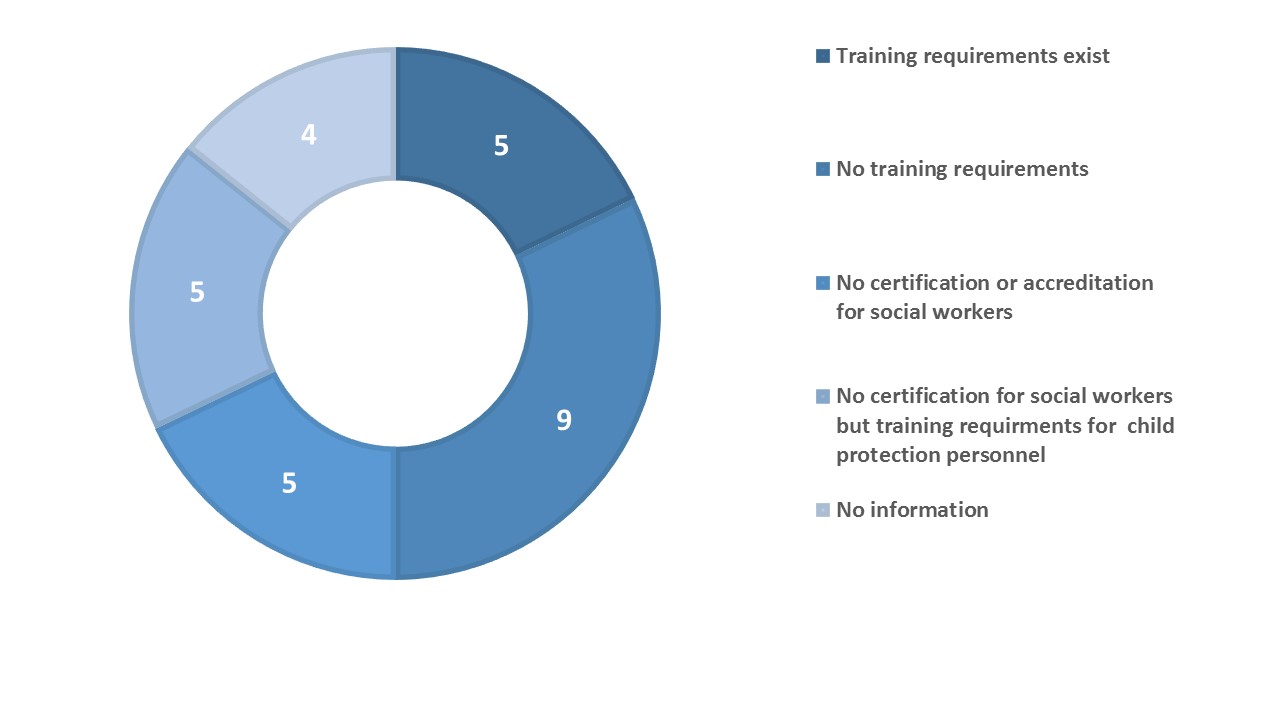Certification and accreditation procedures for professionals
In most EU Member States, the qualification requirements of professionals and personnel working in child protection services are inscribed in the legislative and regulatory framework and are part of the quality elements of the system.
In some Member States, accreditation and licencing procedures exist to ensure compliance with the existing requirements and to promote and ensure the availability of qualified personnel. Such procedures often include checking the compliance with educational qualifications and training requirements, as well as vetting procedures.
Certification of social workers and compulsory training requirements

Note: No information available for Denmark, Finland, Italy and Portugal.
Source: FRA, 2014
Key findings
- Accreditation and licencing procedures for professionals in child protection are not developed in all Member States.
- Accreditation and licensing procedures, when available, are often limited to specific professional groups and do not concern all of those working with children (such as administrative personnel and staff involved in the daily care of children in institutions). Qualifications requirements are therefore general and do not contain precise requirements addressing the specifics of the child protection field.
- Accreditation and licensing procedures do not always involve mandatory training (initial or ongoing) for professionals working with children, including administrative personnel and staff involved in the daily care of children in institutions.
- Very often no review of the accreditation/licence is required. If in place, the stipulated time lapse between reviews varies from two to six years.
- Accreditation and licensing procedures do not always include vetting procedures. Most often vetting is conducted upon appointment.
Certification and accreditation procedures vary within Member States. Some Member States (Belgium, Estonia, Germany, Greece, Luxembourg, Malta, Romania, Spain and Sweden) require proof of an accredited diploma in social work as well as vetting, but no specific training. As a rule, in these cases there are no provisions requiring review.
Only five Member States (France, Ireland, Lithuania, Poland and the United Kingdom) have a certification procedure for social workers that includes training requirements. Certified social workers have to complete a required number of training hours within a given timeline (varying from one to three years).
In other Member States (the Czech Republic, Hungary, Latvia, Slovakia and Slovenia), no certification or accreditation procedures exist for social workers. There are, however, accreditation provisions requiring mandatory training for professionals working in specific positions, such as child protection officers, guardians, social assistants, family assistants and child carers.
In Hungary, for example, there is a compulsory six-year vocational training for social, child welfare and child protection personnel who provide personal care (e.g. employees who work directly with children/families). In the Czech Republic, child protection workers, social workers and teachers are obliged to participate in trainings for a specific number of hours per year, but the content of these trainings is not specified.
In Estonia, the new child act currently under discussion in the Parliament provides for certification and training requirements of all professionals.